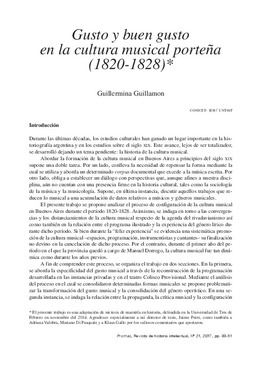Gusto y buen gusto en la cultura musical porteña (1820-1828).
Taste and good taste in the musical culture of Buenos Aires (1820-1828).
Abstract
El objetivo de este artículo es analizar el proceso de configuración de la cultura musical en Buenos Aires durante el período 1820-1828. Esto supone indagar en torno a las convergencias y distanciamientos de la cultura musical en relación con la agenda del rivadavianismo y a la relación entre el programa ilustrado y la experiencia del género lírico durante dicho período. A fin de comprender este proceso, se organiza el trabajo en dos secciones. En la primera, se analiza el proceso en el que se consolidaron determinadas formas musicales a fin de problematizar la transformación del gusto musical y la consolidación del género operístico. En la segunda, se aborda la relación entre la propaganda, la crítica musical y la configuración discursiva de un estándar normativo de buen gusto. El abordaje que nos proponemos en este trabajo busca poner en tensión la imagen que tanto la historiografía como la musicología erigieron de las actividades musicales: prácticas de ocio y distinción o de composición y ejecución que se reducen a la música escrita. Por el contrario, se busca mostrar que la cultura musical porteña fue una compleja esfera artística en la que confluyeron diferentes intereses estéticos y políticos. The aim of this paper is to analyze the configuration process of musical culture in Buenos Aires during the period 1820-1828. This involves inquiring about the convergences and separations of musical culture in relation to the political program of rivadavianismo as well as the influence of the enlightenment and experience of lyric program during that period. To understand this process, the work is organized into two sections. In the first, we analyze the process of transformation of the musical taste and the consolidation of the operatic genre. In a second instance, we inquire the relationship between propaganda, music criticism and discourse configuration of a normative standard of taste. The approach we propose in this paper discusses the idea that historiography as musicology constructed of musical activities: leisure practices or composition and performance are reduced to written music. Rather, it seeks to show that the Buenos Aires musical culture was a complex artistic sphere in which converged different aesthetic and political interests.

